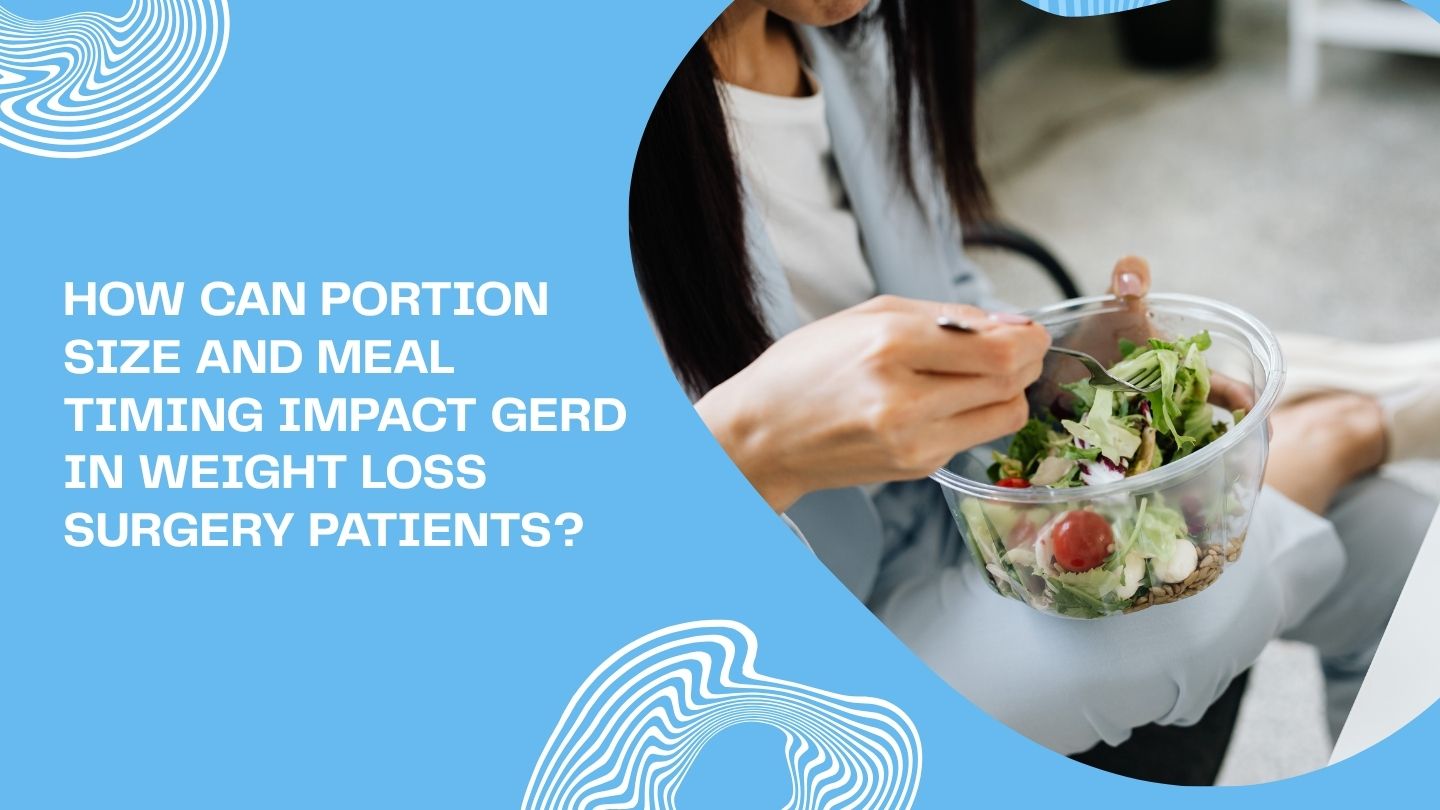
How Can Portion Size and Meal Timing Impact GERD in Weight Loss Surgery Patients?
Portion size and meal timing are key factors in managing GERD for weight loss surgery patients. Understanding how portion size and meal timing can impact GERD in weight loss surgery patients is essential for effective management. Smaller, well-timed meals can help reduce acid reflux. This blog provides practical strategies on how to control meal portions, optimize meal timing, and other tips to alleviate GERD symptoms.
Key Takeaways
- Portion control and smaller, frequent meals significantly alleviate GERD symptoms in bariatric patients by reducing intra-abdominal pressure and improving digestion.
- Meal timing, particularly eating larger meals earlier in the day and avoiding late-night eating, can effectively manage GERD symptoms by enhancing digestive efficiency.
- Professional guidance and lifestyle modifications, including maintaining a healthy weight, proper hydration, and stress management, are essential for long-term GERD relief in weight loss surgery patients.
The Role of Portion Size in Managing GERD
Controlling portion sizes is a fundamental step in alleviating GERD symptoms, especially after gastric bypass surgery. Smaller portions reduce intra-abdominal pressure, making it easier to prevent acid reflux and manage GERD symptoms effectively. Adopting lifestyle changes, including portion control, can significantly enhance the management of GERD symptoms, causes, and treatment, and improve overall digestive health.
Incorporating various lifestyle changes, such as mindful eating and portion control, can significantly alleviate GERD symptoms in patients post-bariatric surgery. It’s not just about what you eat, but how much and how often you eat that can make a significant difference.
Small Meals for Better Digestion
Smaller, frequent meals can be a game-changer for bariatric patients because:
- Consuming large meals can overwhelm the digestive system, leading to acid reflux and difficulty swallowing.
- Eating smaller, more frequent meals can improve digestion and decrease the likelihood of heartburn.
- This approach aligns with the changes in the digestive system post-surgery, where a small stomach pouch requires careful management of food intake for many patients.
Chewing food thoroughly and taking your time with meals is crucial. This not only aids in better digestion but also helps in recognizing when you’re full, preventing the intake of too much food.
Including heartburn-friendly foods like cottage cheese and soft, easily digestible items can further ease heartburn and support your digestive tract.
Avoiding Overeating
Overeating can significantly impact gastrointestinal health, particularly for those with GERD and gastroesophageal reflux disease. Consuming large meals increases stomach pressure and intragastric pressure, which can trigger the release of stomach acid into the esophagus, exacerbating GERD symptoms. This is especially crucial for gastric bypass patients, as the small stomach pouch can stretch, leading to increased acid production and severe heartburn.
Practicing portion control and eating smaller, more frequent meals helps manage GERD symptoms effectively. This approach not only helps in reducing the risk of acid reflux but also promotes weight loss and prevents weight gain, making it a valuable strategy for long-term health.
Portion Control Tips
Managing portion sizes effectively can be achieved through simple yet effective strategies. Using smaller plates can help bariatric patients visually manage portion sizes, making it easier to eat smaller amounts. Practicing mindful eating, such as paying attention to hunger cues and eating slowly, can further enhance portion control and prevent the intake of too much food.
These strategies not only assist in controlling portion sizes but also align with dietary guidance presented in top foods to avoid with acid reflux and GERD for better digestive health, supporting overall weight loss goals. By adopting these mindful eating habits, patients can avoid the pitfalls of overeating and maintain better control over their GERD symptoms.
Meal Timing and Its Impact on GERD Symptoms

The timing of meals can greatly affect the frequency and severity of GERD symptoms in bariatric patients. Strategic meal timing, particularly early consumption, can lead to reduced acid reflux symptoms by allowing for more efficient digestion. Careful meal planning is essential for bariatric patients to manage GERD symptoms effectively.
Eating earlier in the day, avoiding late-night eating, and spacing meals evenly throughout the day are crucial strategies that can significantly affect GERD symptoms. These practices help maintain steady energy levels and minimize digestive discomfort.
Eating Earlier in the Day
Consuming larger meals earlier in the day aligns with higher metabolic rates, which aids in better digestion and may lessen the severity of GERD symptoms. Metabolism tends to peak in the morning, making it an ideal time to consume larger portions that can be digested more efficiently, reducing the risk of acid reflux.
Consuming larger meals during the day can enhance digestion and reduce GERD symptoms for bariatric patients. This not only promotes weight loss but also supports overall digestive health, making it a beneficial strategy for managing GERD.
Avoiding Late-Night Eating
Eating close to bedtime increases the risk of acid reflux during sleep due to the body’s horizontal position. When you lie down, the stomach acid can more easily move into the esophagus, causing discomfort and heartburn. Therefore, it’s advisable to avoid consuming food close to bedtime to reduce the risk of experiencing acid reflux during sleep.
Avoiding large meals and late-night eating can help prevent acid reflux for bariatric patients. This simple lifestyle modification can significantly ease heartburn and improve sleep quality, contributing to better overall health.
Optimal Meal Spacing
Regular spacing of meals throughout the day helps maintain energy levels and can prevent digestive discomfort associated with GERD. By distributing meals evenly, patients can sustain steady energy levels and minimize the risk of acid reflux.
Distributing meals evenly throughout the day is an effective way to manage GERD symptoms. This strategy works cohesively with insights from understanding acid reflux GERD causes symptoms and treatment options, reducing digestive issues, and providing overall symptomatic relief for bariatric patients.
Dietary Choices to Prevent Acid Reflux

Dietary choices play a crucial role in managing acid reflux, especially for weight loss surgery patients. Avoiding trigger foods and choosing heartburn-friendly alternatives can help alleviate GERD symptoms. Making conscious dietary changes can significantly impact GERD management and improve quality of life post-surgery.
From avoiding high-fat and spicy foods to incorporating heartburn-friendly options, the right dietary choices can make all the difference in managing GERD symptoms. These dietary modifications are essential for preventing acid reflux and ensuring long-term health.
Foods to Avoid
High-fat foods such as fried items and fatty meats are known to trigger heartburn and can delay stomach emptying, worsening GERD symptoms. Spicy foods, including chili and pepper, can relax the lower esophageal sphincter and exacerbate GERD symptoms, making it important to limit them in your diet.
Citrus fruits are also known to exacerbate acid reflux symptoms and should be minimized in the diet. Avoiding trigger foods and making dietary changes can effectively manage GERD symptoms and support digestive health.
Heartburn-Friendly Foods
Non-citrus fruits like bananas and melons are less likely to trigger heartburn and can be a great addition to your diet. Lean proteins, such as turkey and chicken, are also good choices that are less likely to cause acid reflux.
Choosing heartburn-friendly foods can significantly reduce the risk of acid reflux. Alkaline foods like bananas and melons can mitigate the effects of stomach acid, providing relief from acid reflux symptoms and promoting better digestive health.
Hydration Tips
Avoiding carbonated beverages is recommended as they can increase stomach pressure, leading to acid reflux. Staying hydrated is essential for weight loss surgery patients to promote weight loss, support overall health, and aid in digestion.
Staying hydrated with water maintains optimal bodily functions and reduces the risk of digestive issues. Choosing water over carbonated drinks can support good health and minimize reflux symptoms, making it a simple but effective strategy.
Lifestyle Modifications for Long-Term Relief
Managing GERD symptoms post-surgery requires long-term lifestyle changes, including:
- Weight loss, which significantly alleviates GERD symptoms by relieving abdominal pressure
- Incorporating high-fiber foods.
- Maintaining hydration to help prevent acid reflux.
Consulting with bariatric surgeons can provide tailored strategies for managing GERD related to a weight loss program following weight loss surgery. These lifestyle changes, along with professional guidance, can significantly improve the quality of life and ease heartburn.
Maintaining a Healthy Weight
Maintaining a stable weight reduces stomach pressure and helps diminish GERD symptoms. Significant weight loss can contribute to a decrease in GERD symptoms by reducing the pressure on the stomach, making it an important consideration for long-term health.
Excess weight can aggravate GERD symptoms due to increased pressure on the stomach. Thus, managing GERD effectively involves maintaining a healthy weight through lifestyle and dietary changes.
Elevating the Head During Sleep
Sleeping with your head elevated is a recommended practice to prevent acid reflux. Raising the head during sleep reduces the likelihood of acid reflux by preventing stomach contents from rising.
Raising the head of the bed by 6 to 8 inches can effectively minimize nighttime acid reflux. It is also advisable to wait at least two hours after eating before lying down to reduce the risk of acid reflux.
Stress Management Techniques
Stress can exacerbate digestive issues, so employing relaxation strategies like meditation may improve GERD symptoms and persistent symptoms. Relaxation methods can mitigate stress-related GERD symptoms, allowing you to experience relief.
Techniques like mindfulness can reduce stress, positively influencing digestion and overall health. Incorporating these stress management techniques as part of your lifestyle changes can significantly ease heartburn and support long-term health.
Medical Interventions and Support
Lifestyle modifications and dietary changes may not always be sufficient to manage GERD symptoms effectively. Medical interventions and professional support play a crucial role in providing relief. Antacids and proton pump inhibitors (PPIs) are common medications used to alleviate heartburn after bariatric surgery. These medications reduce stomach acid production, providing symptomatic relief for acid reflux.
If over-the-counter products don’t help, patients may need prescription-strength medication for heartburn. Long-term reliance on antacid medications is common among patients post-surgery, often requiring additional interventions for relief. Healthcare professionals can tailor treatment options to individual needs, ensuring effective GERD management.
Medications for Acid Reflux
Proton pump inhibitors (PPIs) are frequently prescribed for managing heartburn. These medications work by reducing stomach acid production, which helps ease the symptoms of gastroesophageal reflux disease (GERD). However, PPIs may not be effective for all patients, and some may require additional or alternative treatments to manage their reflux symptoms.
In addition to PPIs, other medications such as antacids can provide quick relief from acid reflux symptoms. Working with a healthcare provider is crucial to determine the most appropriate medication regimen for managing GERD.
Revisional Bariatric Surgery
For some patients, revisional bariatric surgery may be necessary to achieve satisfactory results from initial weight loss surgeries. Revisional bariatric surgery refers to surgical procedures performed to correct or improve the outcomes of previous weight loss surgeries. Such procedures can address persistent GERD symptoms and other post-surgery complications.
Revisional surgery is often considered for patients who do not achieve the desired weight loss or continue to experience significant GERD symptoms despite initial bariatric procedures. These patterns are particularly evident when reviewing distinctions between acid reflux vs GERD, and how to manage them effectively, especially in severe cases. Exploring surgical treatment options with bariatric surgeons can provide long-term relief and improve quality of life.
Professional Guidance
Patients should seek professional guidance to manage GERD following weight loss surgery. Bariatric surgeons and dietitians work together to create personalized treatment plans tailored to patients’ specific needs. Ongoing support from healthcare professionals is crucial for managing GERD and achieving weight loss goals.
Patients are encouraged to reach out to bariatric specialists for personalized advice and treatment options. This multidimensional support aligns with insights from the effect of smoking on GERD and acid reflux, ensuring comprehensive and effective GERD management.
Driving Better Outcomes Through Strategic Eating Patterns
Portion control and disciplined meal timing are central to mitigating GERD symptoms in weight-loss surgery patients. Smaller, evenly spaced meals reduce gastric pressure, support smoother digestion, and minimize reflux triggers. When patients align their eating routines with their altered anatomy, they create a more stable environment for long-term digestive comfort and post-surgical success.
At Wellstar Comprehensive Bariatric Services, we guide patients pursuing weight loss surgery in Austell, Marietta, Smyrna, Cobb County, LaGrange, and West GA with evidence-based strategies that strengthen digestive function and reduce GERD-related setbacks. Our multidisciplinary expertise spans procedures such as gastric bypass, gastric sleeve, GERD management, gallbladder repair, lap-band correction, and lap-band removal to ensure patients receive comprehensive support throughout their bariatric journey. If you’re ready to optimize your postoperative nutrition plan and elevate your long-term outcomes, our team is prepared to support you with personalized, clinically driven direction.
Frequently Asked Questions
What is the portion size after gastric bypass surgery?
After gastric bypass surgery, the recommended portion size is approximately 1/4 cup for solids and 1/2 cup for liquids, with a total caloric intake of around 500 calories per day divided into six to eight small meals. It is crucial to adhere to these guidelines to ensure proper healing and weight loss.
Why is portion control important for managing GERD?
Portion control is crucial for managing GERD because it reduces intra-abdominal pressure, thereby preventing acid reflux and alleviating symptoms. By being mindful of portion sizes, individuals can better manage their condition.
How does meal timing impact GERD symptoms?
Meal timing significantly impacts GERD symptoms; eating earlier in the day and avoiding late-night meals can enhance digestion and lower the likelihood of acid reflux.
What foods should be avoided to prevent GERD symptoms?
To effectively prevent GERD symptoms, it is advisable to avoid high-fat foods, spicy foods, and citrus fruits, as these items can trigger heartburn. Prioritizing a diet low in these triggers can significantly enhance your comfort and health.
What are some heartburn-friendly foods that can help manage GERD?
Incorporating non-citrus fruits like bananas and melons, along with lean proteins such as turkey and chicken, can effectively manage GERD symptoms. These foods are less likely to trigger heartburn and promote digestive comfort.
